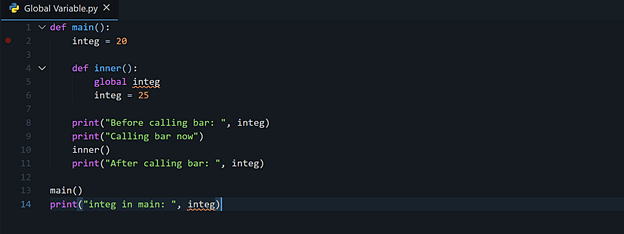Table of Contents
A global variable in computer programming is a variable with a global scope, which means that it is visible (and thus accessible) throughout the entire program unless shadowed. The term “global environment” or “global state” refers to the collection of all global variables. Global variables are typically static in compiled languages and have a lifespan equal to the duration of the program, however, in interpreted languages, global variables are typically allocated dynamically at declaration time because their value is unknown in advance. In some languages, all variables have the global scope or are global by default, although in the majority of current languages, variables typically have lexical scope. However, global variables are frequently available by declaring a variable at the top level of the program. Others, usually modular programming languages that enforce a module structure or class-based object-oriented programming languages that enforce a class structure, do not have global variables.
What is Global Variable In Python?
1: Which of the following data types is immutable in Python?
In the realm of programming, a global declare variable python refers to having a scope throughout the program, meaning that, unless shadowed, the value of a global variable is available throughout the program. In declare variable python, a global variable is frequently declared at the start of the program. In other words, global variables are defined as variables that are declared outside of a python main function. In Python, global variables can be accessed both inside and outside of a function.
Syntax:
X = “sampleGlobalValue”
Def fn1():
“Ready to take your python skills to the next level? Sign up for a free demo today!”
🚀 Start Coding Today! Enroll Now with Easy EMI Options. 💳✨
Gain expertise in Django and open doors to lucrative opportunities in web development.
Start Learning With EMI Payment OptionsHow to Create Global Variables in Python?
To create a global variable in Python, you need to declare the variable outside the function or in a global scope.
Example:
Output:
How to Access the Global Variable Inside and Outside of the Function?
Example:
Output:
You can see how a global variable was declared and used both inside and outside of the function in the example shown above. It’s good that you can access the value both inside and outside of the function, but what happens if you try to change the value of a global scope variable inside of a declare variable python main function?
Another example;
Example:
Output:
This throws an error, as is clear. UnboundLocalError is thrown when you attempt to change a global variable’s value inside of a function because Python sees the global variable x as a local variable while you are changing it, but x is not defined within of the function (myfunc()). The Global keyword enters the scene in this situation. The use of global keywords is demonstrated in the sections that follow.
“Experience the power of our web development course with a free demo – enroll now!”
How to Create Variables With Local Scope in Python with Examples?
The scope of a local variable is the function in which it was declared. It is necessary to invoke the corresponding python main function in order to access the variable. You may, for instance, define a local variable as displayed below.
| def superfunc() | #defining a function |
| x = fantastic | #defining a local variable |
| print(“Python is” + x) | #accessing a local variable |
| superfunc() | #calling the function |
🚀 Start Coding Today! Enroll Now with Easy EMI Options. 💳✨
Gain expertise in Django and open doors to lucrative opportunities in web development.
Start Learning With EMI Payment OptionsGlobal Keyword
The global variable can be changed outside of its present context and meaning by using the global keyword. It is employed to modify the global variable in a local setting. Inside of a function, a global variable can also be created or declared using the term “Global.”
Typically, a local variable (one created within a function) can only be utilized within that function. The global keyword enters the picture at this point, assisting in the creation of global variables inside the function that may be accessed in a global scope.
Syntax:
Def func():
Global variable
Example 1:
Use a global keyword to create a variable in the global scope.
Output:
“Ready to take your python skills to the next level? Sign up for a free demo today!”
Example 2:
Use a global keyword to change the value of the global variable inside the function.
Output:
You now understand what “global” keywords are, how to use them, and some instances. However, Python has some fundamental guidelines for using the global keyword.
See how Global is handled in nested functions.
As it is used as a global keyword, when you create a global keyword variable inside the nested function and when you update the global keyword variable inside the nested function, the changes take effect beyond the local scope.
Example:
Let’s see an example for global in nested functions.
Output:
The output for the global in nested functions is shown above. However, perhaps the little explanation that follows will aid in better comprehension.
The main() method is nested inside the inner() function, where you have specified the global variable.
The variable “integ” takes the value of the local variable main both before and after invoking the inner() function, i.e. integ = 20. The global keyword you used inside the inner() function’s local scope causes the variable ‘integ’ to take the value you specified for it outside of the main() function, i.e., integ = 20. The global keyword variable “integ” will behave as a global keyword outside of the scope if you make any modifications inside the inner() method.
The following are the basic guidelines for using the keyword “global”:
A variable is by default created inside the function in a local context.
There is no need for the global keyword since when you create or define a variable outside of the function, it already has a global context.
To read or alter the global variable inside the function, use global keywords.
A global keyword has no purpose or impact when used outside of the function.
“Get hands-on with our python course – sign up for a free demo!”
How Can You Create Variables Using Global Scope in Python With Examples?
By initialising a variable outside of every function in a Python programme, you can give it a global scope. Additionally, the variable is accessible from anyplace in the Python application.
It’s easy to create a global variable; just follow these steps.
| x = “wonderful” | #defining a global variable |
| def wonderfunc(): | #declaring a function |
| print(“Python is” + x) | #accessing the global variable |
| wonderfunc() | #calling the function |
How to Use Global Keywords in Python With Examples?
Python interprets a variable used inside a function as a reference to a local variable. To modify a global variable within a Python function, use the global keyword. The usage of global keywords in a Python program is demonstrated in the example that follows.
| x = 5 | #initializing a global variable |
| def life() | #defining a function |
| global x | #using global keyword |
| x = x + 2 | #changing the global variable |
| life() | #calling the function |
| print(x) | #accessing the global variable |
























